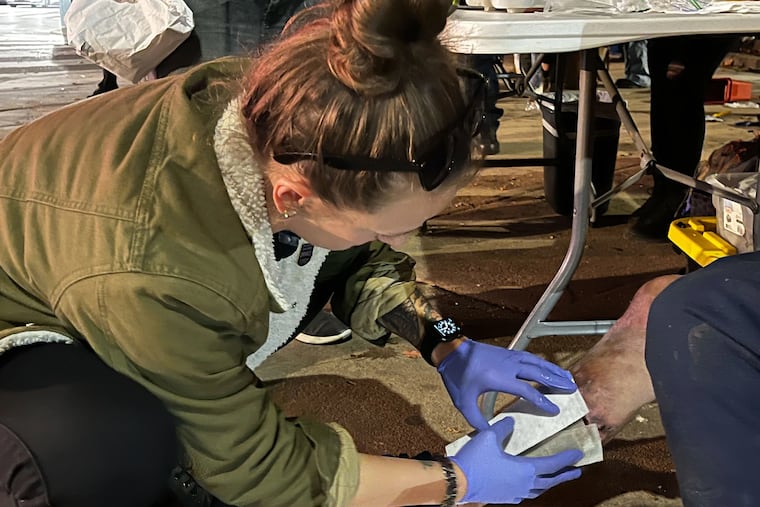Dear future mayor: In the fight against opioids, be bold
We can understand why the prospect of an overdose prevention site, also known as a supervised or safe injection site, gives some elected officials pause. But hear us out.

Leading up to the primary, it was clear crime was on residents’ minds. Indeed, the Democratic winner — Cherelle Parker — ran on a bold plan to fight crime.
But crime is not the only important topic to Philadelphians right now.
In a recent poll of Philly residents, more than half said they believe the opioid overdose crisis should be a top priority for the next mayor. They overwhelmingly endorsed policies that increased access to mental health and substance use treatment, and they rejected policies that focus on arresting and incarcerating people who use drugs.
As clinicians and researchers working in addiction care, we are heartened by the overwhelming support for action. While it will take many “solutions” to address this crisis, there is good reason for hope.
There is good reason for hope.
This widespread support for treatment comes at a critical moment, as overdoses and other complications from substance use are higher than ever, and the nature of the problem is changing. We’re seeing increases in overdose deaths involving both stimulants and opioids, with disproportionate spikes among adolescents, young adults, and Black Philadelphians.
First and foremost, the next administration should focus on increasing access to high-quality substance use disorder care for all Philadelphians who need it. Medications like buprenorphine (Suboxone) and methadone work. But most people can’t get them.
The city must provide same-day access to these effective medications for people willing to seek treatment and make it easier for people to stay in treatment by adopting approaches that prioritize medication access as soon as possible, and deliver care to people when and where they need it.
It’s also not enough to support care that works; we also must stop funding treatment that does not work — such as kicking patients out of treatment programs if they are not fully abstinent or imposing burdensome rules to access medication. Until it is easier to access care that fits their needs, many will continue to go untreated.
This addiction care must also treat the negative health consequences that often accompany substance use, like HIV, hepatitis C, and wounds, which have worsened recently due to the emergence of xylazine, a veterinary tranquilizer that has made its way into the street drug supply in Philadelphia.
Second, harm reduction programs — such as those that provide syringe access, naloxone to reverse overdoses, and drug checking programs, which test drugs to identify contaminants — reduce the risk of overdose and infectious diseases. Many people — especially young people — die because the drugs they use are not what they thought they were. To increase access, Philadelphia should make services more widely available outside of Kensington.
The next mayor should also support the opening of an overdose prevention site, also known as a supervised or safe injection site, which provides people with a safe place to use drugs and medical assistance in case of overdose. The locations that opened last year in New York City have reversed more than 890 overdoses, (none of these overdoses resulted in death) and linked many more individuals with important health services.
» READ MORE: In election season, people care about Kensington. Then we become invisible again. | Opinion
Unfortunately, a bill currently making its way through the state legislature could criminalize these facilities, despite evidence that they improve outcomes for people who use drugs and the surrounding communities. Several members of City Council are trying to ban these sites from their districts, and the Democratic candidate for mayor, Cherelle Parker, was the most vocal in her opposition to supervised injection sites. Even our governor doesn’t like them.
We can understand why the prospect of these sites gives some elected officials pause. But hear us out.
Not all public health interventions are popular at the outset, even those backed by research. When something as benign as seat-belt laws were first introduced, there was a wave of pushback and resistance, despite evidence that they could save lives. Philly residents haven’t had a chance to see how overdose prevention sites can work in our city. The best way to find out is to test it, evaluate the findings, and share the data with the public.
Finally, the next mayor should address substance use and overdose by focusing on broader social needs, particularly housing, education, neighborhood conditions, and criminal justice reform. Research shows that addressing substance use disorders with incarceration and other criminal justice interventions does not work. Instead, ensuring that people have safe places to live, work, learn, and enjoy life will benefit the entire city, not only those in our community with substance use disorders.
Our new mayor will take office at a time of unprecedented promise. For the first time, companies that profited from opioid sales have paid billions of dollars into settlements to reverse the overdose crisis. That money — more than $1 billion for Pennsylvania alone — is now beginning to arrive in the cities and counties devastated by the overdose crisis.
This is a once-in-a-generation opportunity that we must not squander. We must hit this crisis with every science-based tool at our disposal while being mindful of what works.
So we say to the next mayor: Be bold. Aim high. The lives of thousands in our city depend on you.
Margaret Lowenstein and Shoshana Aronowitz are senior fellows of the Leonard Davis Institute of Health Economics. Aronowitz is a family nurse practitioner and an assistant professor in Penn’s School of Nursing. Lowenstein is an addiction medicine physician and an assistant professor at the Perelman School of Medicine.